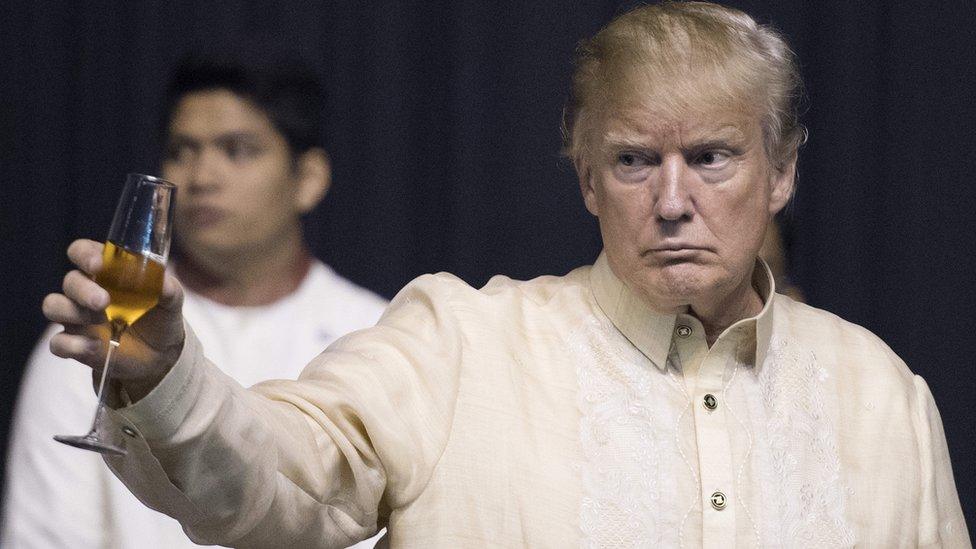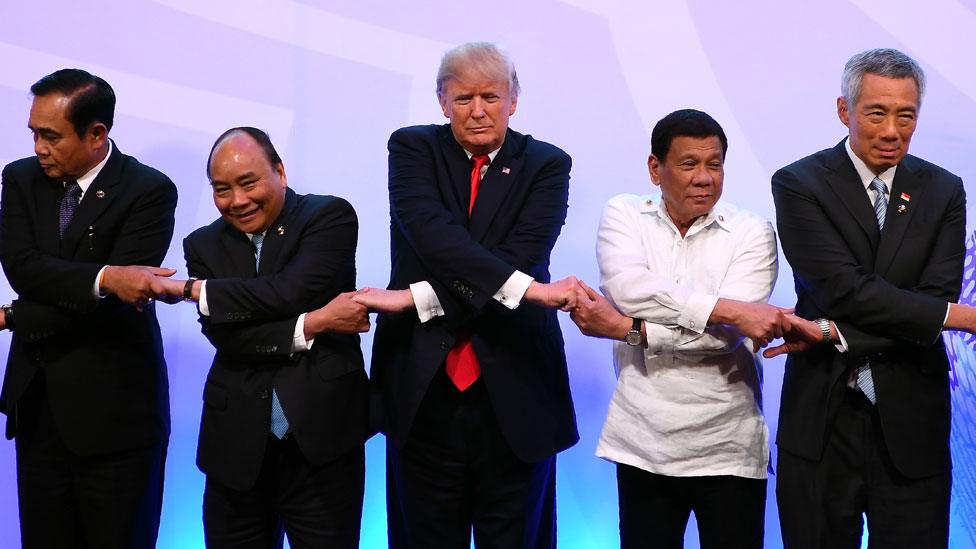One Trump tweet is what US will recall about Asia trip
- Published

Donald Trump gave a number of high-profile speeches during his Asia trip - though most Americans would be hard-pressed to remember the details.
He pushed for a regional response to North Korea's continued work on missile and nuclear weapons programmes. He touted trade issues and American jobs - albeit by criticising his presidential predecessors. He repeatedly used the term "Indo-Pacific" as a way to emphasise the importance of India in US strategic plans for the region.
In the US, however, the news cycle churned on without him. The Sutherland Springs shooting overshadowed his first weekend abroad. The Republican rout in Virginia state elections stole midweek headlines.
Two days later, the Washington Post broke bombshell allegations that four decades ago Roy Moore, the Republican nominee in an Alabama special election to replace Jeff Sessions in the US Senate, had sexually abused a 14-year-old.
All were bigger stories than the presidential foreign forays. By far.
It's a challenge for presidents to garner attention when they're abroad short of an international crisis or a massive gaffe, even when they aren't flying into the kind of domestic news headwinds Mr Trump encountered over the past 10 days.
Trump had plenty of gaffes of the non-massive kind, of course - some real, some overplayed by media outlets eager to confirm the suspicions of the president's detractors.
The US president keeps mentioning Indo-Pacific
The first was the koi karp feeding episode, when the US president emptied a whole box of food into the koi pond.
But it turned out Mr Trump had simply followed the lead of Japanese Prime Minister Shinzo Abe.
Then the president's comments about how Japanese auto companies ought to manufacture cars in the US were taken out of context, compounded by his convoluted syntax.
"This quickness to pile on the president, at the expense of policy analysis, illustrates a growing problem on the left," he writes.
"Liberals and their media allies are becoming knee-jerk anti-Trumpists, always on the lookout for the president's next embarrassing, meme-able gaffe - and sometimes pouncing without getting their facts straight."

There were awkward moments
Then there were controversies more grounded in reality. The president's insistence that Vladimir Putin believes Russia didn't meddle in the 2016 US elections and his swipes at former leaders of the US intelligence community as "hacks" required him to later affirm his support for US intelligence agencies.
The Putin story was further fuelled by Mr Trump's Twitter habit, as he lashed out at the media and "Crooked Hillary Clinton". He called his critics "haters and fools" who did not understand that a friendly relationship with Russia was "a good thing."
The biggest Twitter bombshell, however, came when the president bristled at Kim Jong-un for calling him "old", grousing that he would never call the North Korean leader "short and fat".
"I try so hard to be his friend," he continued, "and maybe someday that will happen!"
The line was grist for late-night US comics and unleashed a thousand hot takes across the media landscape.
China: President Trump vs candidate Trump
The volubility of the president's tweets from the Philippines stood in sharp contrast to the first half of his foreign trip, where he was relatively restrained. It added some credence to the theory that Melania Trump, who parted ways with the president after their China visit, can be a moderating influence on the president.
Mr Trump has frequently boasted about the power of his tweets, having called them "modern-day presidential", external. No matter where he is - at the White House, in one of his golf resorts or thousands of miles around the globe, his Twitter feed can cut through the noise (and add to the headaches of the White House staff).
The president wouldn't have it any other way.
"You know they are well-crafted," Mr Trump told an interviewer who asked him about his Twitter usage last month. "I was always a good student. I am like a person that does well with that kind of thing. And I doubt I would be here if it weren't for social media, to be honest with you."
Mr Trump made it to the top office in the US in part thanks to his prolific use of social media to drive news coverage. Chances are, his "short and fat" tweet will be the lasting impression most Americans take from the president's trip to Asia.